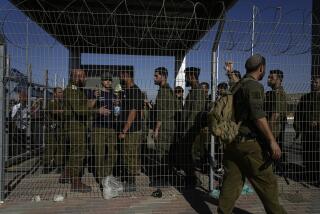Officers Urged Lies in Abuse of Iraqis
- Share via
FT. CARSON, Colo. — Three Army officers admitted Friday that they urged a group of soldiers accused of causing the drowning of an Iraqi detainee to cover up part of their story to avoid a court-martial and protect the chain of command.
Lt. Col. Nathan Sassaman, known for his aggressive approach to battling insurgents in Iraqi cities such as Balad and Samarra, testified before a military court that he told his men to mislead investigators.
“I said something to the effect of ‘Don’t talk about the water,’ ” Sassaman said during the last day of a hearing to decide whether the soldiers should face court-martial.
Another officer, Capt. Matthew Cunningham, warned the soldiers to corroborate one another’s stories.
“I told them they need to get together and make sure their stories are consistent,” Cunningham testified. “I told them if there was any mention of the water, the company leadership would be changed.”
The story they wanted told was that two Iraqi curfew violators were picked up on Jan. 3 and later released by the Tigris River. The reality was that the Iraqis were forced to jump from an embankment into the river, where one of them apparently drowned.
The soldiers involved, members of the 3rd Combat Brigade, based at Ft. Carson, face a variety of charges, some carrying maximum sentences of 10 years in prison.
Sgt. 1st Class Tracy E. Perkins is charged with manslaughter, assault, conspiracy and obstruction of justice. Sgt. Reggie Martinez is charged with manslaughter. Spc. Terry Bowman is charged with assault, and 1st Lt. Jack Saville faces manslaughter, assault, conspiracy, making false statements and obstruction of justice charges. Saville has not appeared, because his lawyer was not prepared.
The investigating officer presiding over the hearing will decide whether a court-martial is warranted in the days ahead.
Sassaman, Cunningham and Maj. Robert Gwinner were not present during the incident but were reprimanded afterward. They testified Friday under grants of immunity from prosecution.
Sassaman said he covered up the facts because the soldiers assured him that the Iraqis had managed to get out of the water.
“I thought no harm, no foul if these people walked away,” he told the court. “I said the soldiers needed to be punished. I had hoped it would be done at my level in a nonjudicial way.”
He said he also feared that insurgents would use the episode to discredit his battalion, which had aggressively pursued them -- in one case, taking part in 36 combat operations in 48 hours.
“Samarra is not the city of the good Samaritan,” said Sassaman, a former West Point quarterback. “It’s Dodge City. The [insurgents] were killing us in the information war, and this would be a reason to seize on this. It could drag all the good work we did down the toilet.”
Cunningham said forcing the Iraqis into the water was an effort to punish the curfew violators by making them wet and miserable. “I believe it was a bad decision,” he said. “But it was a tactical mistake, not a criminal mistake.”
At least two soldiers in the platoon reported seeing both men on the riverbank after they were forced to jump in.
But the parents of the alleged dead man, Zaydun Ma’mun Fadhil, said he washed up downriver a week after the incident. They made a video of his disfigured corpse, but no American investigator ever saw the body.
The defense claimed the death was faked to either collect money from the occupation authority or throw soldiers off the scent of wanted fighters.
In his closing argument, the prosecutor, Capt. Tom Schiffer, said there was no question the Iraqis were thrown into the river and in fact, he said, there was evidence that Perkins had been involved in a similar incident in Balad. Although no American had viewed the body, the deceased man was identified by Iraqi police and his family, Schiffer said.
More to Read
Sign up for Essential California
The most important California stories and recommendations in your inbox every morning.
You may occasionally receive promotional content from the Los Angeles Times.










